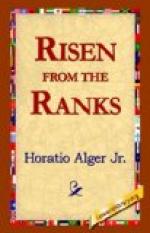“We will hope so, at all events.”
A letter was at once despatched, and in a week the answer was received.
“I am sorry,” Mr. Anderson wrote, “to decline your proposals, but, I have immediate need of the whole sum which I ask for the paper. If I cannot obtain it, I shall come back to Centreville, though I would prefer to remain here.”
Upon the receipt of this letter, Ferguson gave up his work for the forenoon, and made a tour of the Village, calling upon all who he thought were likely to have money to lend. He had small expectation of success, but felt that he ought to try everywhere before giving up so good a chance.
While he was absent, Harry had a welcome visitor. It was no other than Professor Henderson, the magician, in whose employ he had spent three months some years before, as related in “Bound to Rise.”
“Take a seat, professor,” said Harry, cordially. “I am delighted to see you.”
“How you have grown, Harry!” said the professor. “Why, I should hardly have known you!”
“We haven’t met since I left you to enter this office.”
“No; it is nearly three years. How do you like the business?”
“Very much indeed.”
“Are you doing well?”
“I receive fifteen dollars a week.”
“That is good. What are your prospects for the future?”
“They would be excellent if I had a little more capital.”
“I don’t see how you need capital, as a journeyman printer.”
“I have a chance to buy out the paper.”
“But who would edit it?”
“I would.”
“You!” said the magician, rather incredulously.
“I have been the editor for the last two months.”
“You—a boy!”
“I am nineteen, professor.”
“I shouldn’t have dreamed of editing a paper at nineteen; or, indeed, as old as I am now.”
Harry laughed.
“You are too modest, professor. Let me show you our last two issues.”
The professor took out his glasses, and sat down, not without considerable curiosity, to read a paper edited by one who only three years before had been his assistant.
“Did you write this article?” he asked, after a pause, pointing to the leader in the last issue of the “Gazette.”
“Yes, sir.”
“Then, by Jove, you can write. Why, it’s worthy of a man of twice your age!”
“Thank you, professor,” said Harry, gratified.
“Where did you learn to write?”
Harry gave his old employer some account of his literary experiences, mentioning his connection with the two Boston weekly papers.
“You ought to be an editor,” said the professor. “If you can do as much at nineteen, you have a bright future before you.”
“That depends a little on circumstances. If I only could buy this paper, I would try to win reputation as well as money.”




